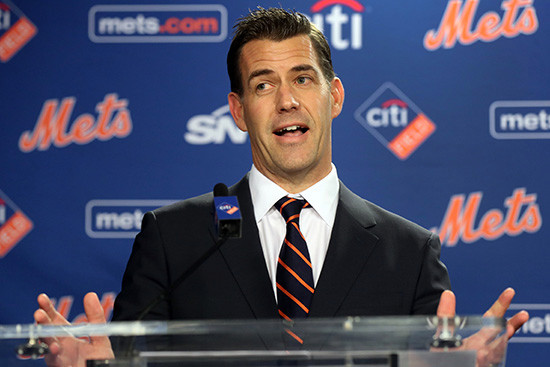The New York Mets hired Brodie Van Wagenen, a former agent and co-head of the baseball division at the Creative Artists Agency, to be their new general manager. Will his lack of front office experience and background as an agent pay off or fail him?
Brodie Van Wagenen will prove his critics wrong
Alden Tabac
The process of hiring a general manager has traditionally focused on front office experience. Most of today’s GMs have worked their way up from lower positions in a professional sporting organization. Brodie Van Wagenen’s experience as an agent brings unique qualities to the job that other GMs who have followed the typical path do not have. His time as a player agent representing Mets stars Yoenis Céspedes, Todd Frazier, and Jacob deGrom gives him a personal connection with three of the team’s leaders. Moreover, Van Wagenen got to understand the general manager position from the other side of the conference table, from his several successful negotiations with current GMs. His well-rounded understanding of player and front office dialogue gives him the advantage of being a more shrewd negotiator than GMs of other teams.
Van Wagenen is a progressive thinker who has used sabermetrics to assist clients in signing lucrative contracts: Before entering negotiations with the Mets to sign Céspedes, Van Wagenen used analytics to find Céspedes’ monetary value based on the revenues he produced on and off the field. With similar methods, the new GM can find players with the best dollar-per-production value and field a team whose performance matches its payroll.
Sports teams that have strayed from traditional methods have reaped the rewards. For example, the current Golden State Warriors dynasty was built by agent-turned-GM Bob Myers, and, without any previous managerial experience, New York Yankees manager Aaron Boone just led his team to a 100-win season. Although Van Wagenen cannot get the Mets to a World Series next season, his critics will come around to his hiring.
Mets Strike Out On General Manager Hire
Mitch Bannon
Brodie Van Wagenen’s ‘crossing the aisle’ to become a GM poses obvious dilemmas even though the Mets claim that there are provisions in Van Wagenen’s contract to deal with potential conflicts of interest. As an agent, he worked for several of his new employees, including pitcher Jacob deGrom, outfielder Yoenis Céspedes, and quarterback-turned-baseball-prospect Tim Tebow. Now employing the players he once represented and advocated for, it’s unclear whether he can move past his personal relationships with those players and act in the best interest of the franchise.
Agents are privy to all sorts of information. For example, with critical contract negotiations coming up for DeGrom, there are worries that Van Wagenen could exploit this information. All corners of the industry have noticed the potential problems Van Wagenen’s appointment may cause. Players Association Executive Director Tony Clark noted the many calls and texts of concern he has received following Van Wagenen’s hiring. Agent Scott Boras underscored the importance of an agent’s commitment to their clients, insinuating that Van Wagenen’s former Mets clients could feel betrayed depending on his actions as GM.
Van Wagenen may scout and manage talent well, but previous sports agents’ attempts to hold one of baseball’s most coveted positions have gone poorly. Most recently, the hiring of Dave Stewart—a former player and agent—resulted in some of the worst personnel moves in Arizona Diamondbacks history, and he was fired two years later.
Beyond the controversy surrounding his past profession, Van Wagenen’s incompetencies are already showing. He claimed the lowly 77-win Mets—and their bottom five farm system—can avoid a rebuild. With ample dissention and no sign of competent managerial practice to compensate, the Mets will need a miracle to save themselves from wasting the primes of Jacob DeGrom, Noah Syndergaard, and even Tim Tebow.
Editors’ pick
It is a savvy hire. Van Wagenen got to this position by way of his acumen in baseball and business. The salesmanship abilities he developed as agent will be put to good use, and he has a headstart on getting his former clients to buy in to the role change.









